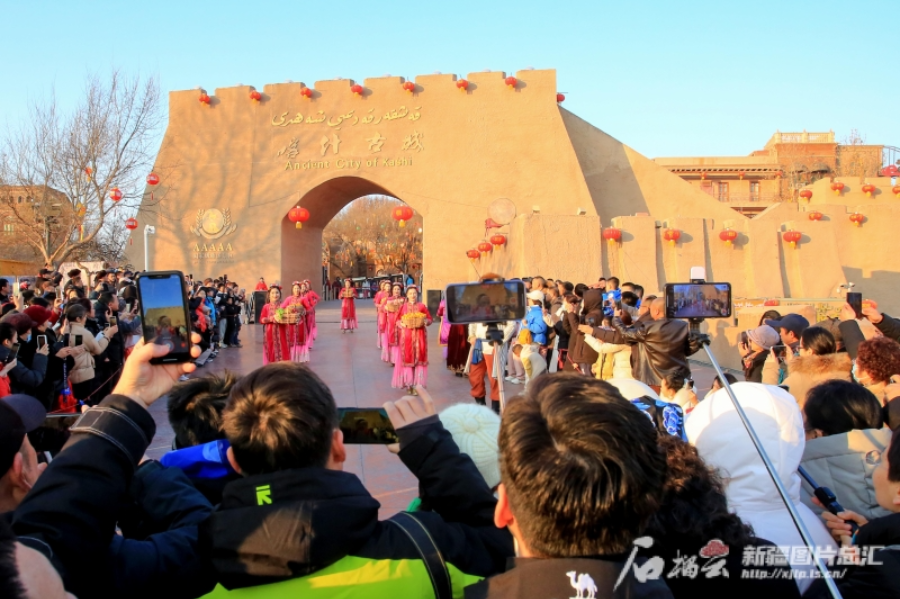Shiliuyun-Xinjiang Daily (Reporter Zhang Lei) news: With 54 votes in favor, 0 votes against, and 0 abstentions, the Regulations on the Protection of the Ancient City of Kashi in Xinjiang Uygur Autonomous Region (hereinafter referred to as the "Regulations") was unanimously passed during the 9th session of the 14th Standing Committee of the People's Congress of the Xinjiang Uygur Autonomous Region on the morning of March 31, 2024. This is the first legislation specifically tailored for the protection of an ancient city in Xinjiang, and it will come into effect on May 1 this year.
Kashi is an important stop along the ancient Silk Road, serving as a hub for cultural and economic exchanges between the East and the West. The ancient city of Kashi, located in the center of Kashi City, carries the history and cultural heritage of the Silk Road. It used to be a large area of dilapidated houses in Kashi. In 2010, a project was initiated with an investment of over seven billion yuan (about 975 million U.S. dollars) to revamp the dilapidated houses, focusing on preserving the historical and cultural value of traditional houses while making renovations and reinforcements on the basis of retaining their original spatial layout. These efforts have been highly praised by UNESCO.

Photo taken on February 10, 2024 shows a performance at the gate opening ceremony of the ancient city of Kashi in Kashi City, Kashi Prefecture, northwest China’s Xinjiang Uygur Autonomous Region. (Photo by Shiliuyun-Xinjiang Daily/ Cai Zengle)
In recent years, as the tourism development of the ancient city of Kashi has flourished, finding a balance between preserving its historical features and commercial development has become a new challenge. Issues such as unclear protection responsibilities and insufficient representation of traditional culture need to be addressed. "Governance by law is the most effective approach," stated Ma Jian, the director of the Committee on Ethnic and Religious Affairs under the Standing Committee of the People's Congress of the Xinjiang Uygur Autonomous Region. "Considering the above factors, we formulate and promulgate this ‘Regulations’."
The "Regulations" consists of five chapters and 30 articles, emphasizing both the planning and protection of the ancient city of Kashi and focusing on its inheritance and utilization. To effectively protect the ancient city and highlight its unique characteristics, the "Regulations" specifies the objects of protection planning and prohibit many acts detrimental to the preservation of the ancient city. To prevent excessive commercialization and disorderly development, it stipulates that business activities within the protected area must comply with the commercial layout, project control, and relevant requirements.
“The ancient city of Kashi has finally found legal protection, embarking on a new chapter of prosperity,” said Yang Yanfeng, the deputy mayor of Kashi City. In line with the "Regulations," the government will arrange for relevant authorities to legally draft a conservation plan for the ancient city.
To prevent the ancient city of Kashi from losing its cultural distinctiveness, unique individuality, and historical and cultural essence during the conservation process, Zhou Qin, the deputy director of the Legislative Affairs Commission of the Standing Committee of the People's Congress of the Xinjiang Uygur Autonomous Region, stated that the "Regulations" focuses on effectively revitalizing and utilizing the historical culture based on its protection.
Zulpukar Ababakri, an inheritor of the intangible cultural heritage of pottery-making in Kashi, hopes that after the implementation of the "Regulations," more and more people will be able to experience the charm of Kashi's traditional culture.
The "Regulations" encourages residents of all ethnic groups in the protection area to continue to live there, participate in the protection and utilization of the ancient city of Kashi. This includes showcasing the local traditional production and living methods, and carrying out folk cultural activities. Ma Jian said, "This is beneficial to display the history and folklore of the ancient city, further promote the mutual learning and exchanges of the cultures of all ethnic groups, and effectively forge the sense of community for the Chinese nation in a visible, perceivable, and effective way."
(A written permission shall be obtained for reprinting, excerpting, copying and mirroring of the contents published on this website. Unauthorized aforementioned act shall be deemed an infringement, of which the actor shall be held accountable under the law.)









